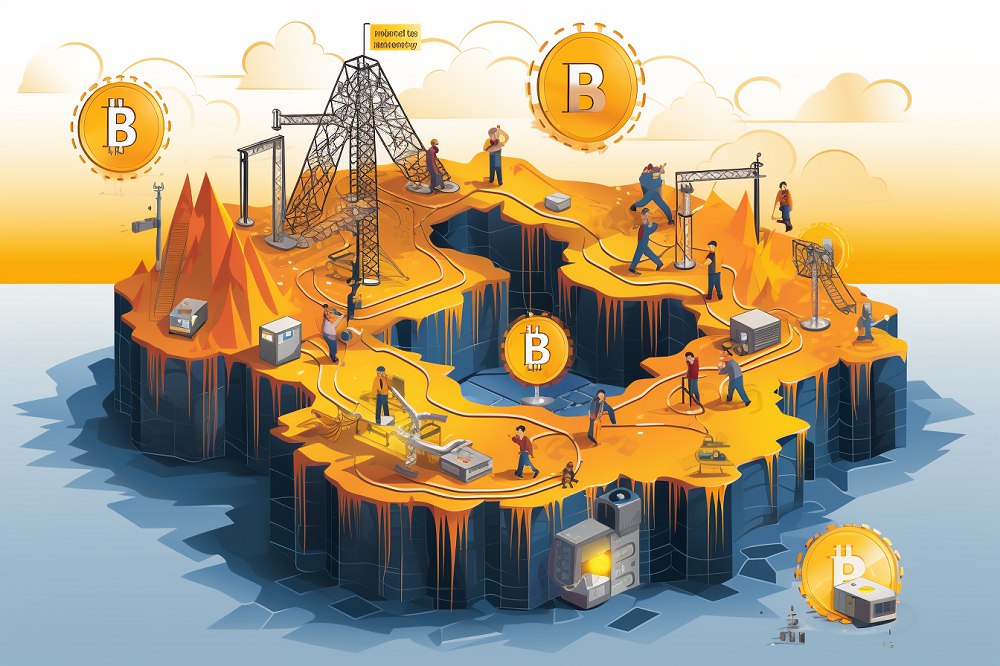Bitcoin mining and transaction validation are pivotal processes securing the blockchain’s integrity. While distinct, both play essential roles in maintaining the network’s reliability and functionality.
This guide explores the fundamental disparities between validating Bitcoin transactions and mining Bitcoin. It also sheds light on the complex steps in processing blocks on the Bitcoin blockchain and minting new BTC.
The Essence Of Bitcoin Validation Nodes
Bitcoin validation nodes act as crucial security hubs in the Bitcoin network. They ensure that every transaction entering the network is legitimate, accurate, and follows the established rules.
They verify the transaction fees and check if the sender has enough Bitcoin to complete the transaction. These nodes play a key role in preventing fraudulent activities, such as double-spending, ensuring that each Bitcoin is only used once in a transaction.
They hold a complete copy of the Bitcoin blockchain, allowing them to cross-check transactions against the entire transaction history to confirm their validity. Moreover, these nodes relay information across the network, communicating with miners about the blocks ready for verification.
They’re instrumental in maintaining synchronization within the network, helping to keep all nodes updated with the latest validated blocks. Some nodes even double up as wallets, enabling users to interact with the network by managing their addresses and signing transactions securely.
This functionality makes them pivotal in maintaining the integrity and smooth functioning of the entire Bitcoin ecosystem. Some nodes also serve as wallets, facilitating user interaction with the network by managing addresses and transaction signings.
Overview Of Mining Nodes
Mining nodes in the Bitcoin network help to add new blocks to the blockchain. These nodes stand out due to their heavy reliance on computational power, performing complex mathematical tasks as part of the Proof-of-Work (PoW) consensus mechanism.
These nodes are not your regular computers; they’re equipped with specialized hardware designed explicitly for solving cryptographic puzzles. Mining nodes engage in a competitive race to solve these puzzles by validating blocks transmitted by the validation nodes.
The first successful miner verifies the block and earns the coveted block reward, including newly minted Bitcoin and transaction fees. Mining nodes ensure the validation of transactions before adding them to the blockchain, contributing significantly to the network’s security and reliability.
The energy-intensive nature of mining nodes highlights their crucial role in fortifying the Bitcoin network against fraud or threats.
Steps Involved In Mining Bitcoin
Mining Bitcoin involves complex steps pivotal in adding new transactions to the blockchain and earning rewards.
Block Formation: Transactions verified and validated by the network are grouped into blocks, creating a unit for miners to work on.
Cracking the Puzzle: Miners delve into solving complex mathematical problems using powerful hardware. They compete to generate a unique digital fingerprint hash that meets specific criteria set by the Proof-of-Work (PoW) algorithm. This hash needs to be below a certain target value.
Computational Competition: Miners use their computational resources to race against each other to find this target hash. The first to succeed claims the right to add the block to the blockchain.
Verification and Reward: The winning miner verifies the block, ensuring the accuracy of transactions within it. As a reward for their effort and computational power expended, they receive freshly minted Bitcoin and transaction fees contained in the block.
This algorithm dynamically adjusts the difficulty level of the puzzles to maintain this time frame, ensuring a stable and secure network.
Bitcoin Mining Reward
The Bitcoin mining process is rewarding for successful miners. Those validating and adding blocks to the blockchain receive newly minted Bitcoin as a reward.
This incentive system motivates miners to contribute computational power and maintain network security. Despite their crucial role, validation nodes don’t engage in mining and, therefore, don’t receive these rewards.
This reward mechanism is fundamental to sustaining the Bitcoin network; it fosters competition among miners while bolstering the network’s integrity.
Strengthening Network Security
The process of Bitcoin mining enhances the security of the network. This high computational requirement is a deterrent against potential attacks, making it prohibitively costly for malicious actors to compromise the network or manipulate transactions.
The complexity of mining contributes significantly to the robustness of Bitcoin’s security, ensuring the reliability and integrity of the entire blockchain ecosystem.
Future Prospects In Validation And Mining Roles
The future of validation and mining roles in the blockchain ecosystem holds promise. Factors like halving events, technological advancements in mining hardware, and evolving validation techniques will shape the landscape.
The industry anticipates improvements in exploring diverse blockchain applications beyond conventional currency transactions. This evolution presents opportunities for groundbreaking technologies and regulatory frameworks to foster a balanced and efficient ecosystem.
